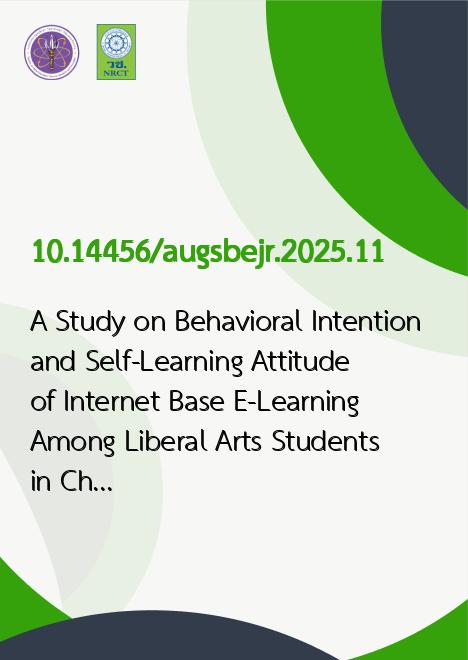
|
A Study on Behavioral Intention and Self-Learning Attitude of Internet Base E-Learning Among Liberal Arts Students in Chengdu, China |
|---|---|
| รหัสดีโอไอ | |
| Creator | Wang Xiang |
| Title | A Study on Behavioral Intention and Self-Learning Attitude of Internet Base E-Learning Among Liberal Arts Students in Chengdu, China |
| Publisher | Assumption University Press |
| Publication Year | 2568 |
| Journal Title | AU-GSB e-Journal |
| Journal Vol. | 18 |
| Journal No. | 1 |
| Page no. | 106-115 |
| Keyword | Perceived Usefulness, Perceived Ease of Use, Perceived Enjoyment, Self-Learning Attitude, Behavioral Intention |
| URL Website | http://www.assumptionjournal.au.edu/index.php/AU-GSB/article/view/7852 |
| Website title | AU-GSB e-Journal |
| ISSN | 1906-3296 |
| Abstract | Purpose: This study aims to investigate factors impacting students on the behavioral intention to self-learning and self-learning attitude of internet base e-learning for Liberal arts students in Chengdu, China including system quality, information quality, service quality, perceived usefulness, perceived ease of use, perceived enjoyment, self-learning attitude, and behavioral intention. Research design, data, and Methodology: The sample size involves 500 students in liberal arts in the first to third year. A questionnaire is designed, investigated and statistically analyzed. The sample techniques are judgmental, quota and convenience sampling. The index of item-objective congruence and the Cronbach's Alpha test were conducted before the data collection. Data analysis involved employing confirmatory factor analysis and structural equation modeling techniques. Results: The findings revealed that system quality and service quality significantly influence percived usefulness. Perceived ease of use has a significant influence on perceived usefulness and perceived enjoyment. Perceived usefulness significantly influences behavioral intention. In contrast, perceived ease of use and perceived usefulness have no significant influence on self-learning attitude. Additionally, information quality has no significant influence on perceived usefulness. Conclusions: These findings have significant implications for educators and policymakers in designing and implementing effective e-learning programs that foster a positive attitude toward self-directed learning. |
